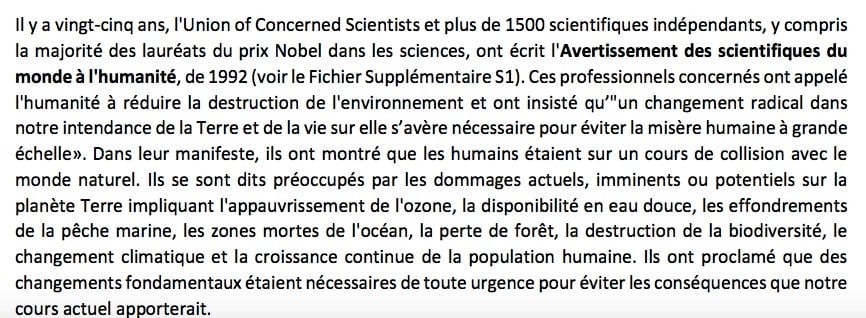15,000 scientists just signed the largest-ever warning about Earth’s destruction
There’s no place like home, our warm and watery planet Earth. But we won’t be living here long if humans don’t change their ways, say 15,365 scientists from 185 countries who want your attention.


There’s no place like home, our warm and watery planet Earth. But we won’t be living here long if humans don’t change their ways, say 15,365 scientists from 185 countries who want your attention.
On Nov. 13, the journal BioScience published the “World Scientists’ Warning to Humanity: A Second Notice” in four languages—English, French, Spanish, and Portuguese. The first warning was issued in 1992 when 1,700 members of the Union of Concerned Scientists argued that humans are “on a collision course with nature.” That group, which included numerous Nobel laureates, urged the world to save the Earth from extreme climate change by burning fewer fossil fuels, preserving forests, limiting population growth, and improving food production.

“On the twenty-fifth anniversary of their call, we look back at their warning and evaluate the human response,” contemporary scientists write.
Brace yourselves—we didn’t respond well, the scientists find.
Since 1992, with the exception of stabilizing the stratospheric ozone layer, humanity has “failed to make sufficient progress in generally solving foreseen environmental challenges, and alarmingly, most of them are getting far worse,” the paper states. Its authors say they are especially troubled by “the current trajectory of potentially catastrophic climate change…from burning fossil fuels, deforestation, and agricultural production—particularly from farming ruminants for meat consumption.”

They also point out that this rapid heating has “unleashed a mass extinction event, the sixth in roughly 540 million years.” Scientists predict many current life forms could be annihilated or near extinction by the end of this century.
Still, there’s some hope. Humans have shown that, with concerted effort, we’re able to make positive and sustainable changes. The global decline in use of ozone-depleting substances shows progress is possible and destruction isn’t inevitable, the scientists argue. Overall, humans have made advancements in reducing extreme poverty and hunger, declines in deforestation in some regions, and rapid growth in the renewable-energy sector.

But more must be done. The paper calls on all to help by being informed consumers and voters, lest we find ourselves homeless. Time is running out, the scientists remind us:
To prevent widespread misery and catastrophic biodiversity loss, humanity must practice a more environmentally sustainable alternative to business as usual. This prescription was well articulated by the world’s leading scientists 25 years ago, but in most respects, we have not heeded their warning…We must recognize, in our day-to-day lives and in our governing institutions, that Earth with all its life is our only home.
🌍 Quartz is running a series called The Race to Zero Emissions that addresses the challenges and opportunities of low-emissions technologies. Sign up here to be the first to know when stories are published.